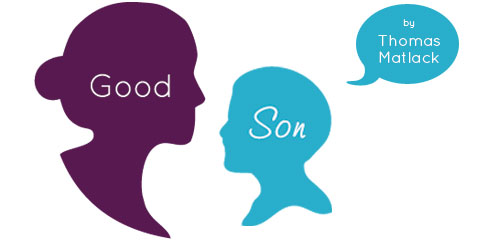
I sat in the front row within arm's length of my sister and her committee as she masterfully articulated the impact of multiple childhood traumas on personality and its relationship to dissociation. I held my second wife Elena's hand tightly, interested but also fearful. A woman of enormous grace and warmth, she makes up for my social deficiencies.
My parents sat immediately behind us, my mother giving a virtual play-by-play of "right", "yes", and a variety of vocal affirmations that expressed her heightened state of engagement without the benefit of language. Decades before, she too had presented a dissertation en route to becoming a psychologist, a job which she held for most of her adult life.
I tried not to block out the impact of having a shrink for a mother and the parallel now of having a sister who, for very different reasons, had followed in her footsteps. I tried to focus on a returning Iraq veteran medic I recently heard talk about losing 11 men on the battlefield before coming home to blackouts and profound personality changes that caused him to seek out help.
Out of nowhere, I heard the sound of a baby crying hysterically (I later discovered that there had been a class on babies in the next room). My sister was discussing her sample and how much of the trauma had occurred when the victims were pre-verbal. Mom grunted approval. I closed my eyes, my skin crawling. Though not a victim of abuse, I was dissociating all the same.
Friday, I drove to Exeter Academy to speak at the Independent School Health Association conference. There were 150 deans of students, nurses, and school counselors in the audience. Dr. Michael Thompson, author of Raising Cain, was to speak first. I had been asked to present The Good Men Project--a foundation aimed at sparking national dialogue about manhood and helping boys in the process--and then finish the day on a panel which included Thompson, a specialist on boys and the internet.
I sat in the back listening to Thompson, a world-famous lecturer, as he paced back and forth. Half an hour in, I was livid. I had expected stories about boys, but what Thompson was describing was the way boys, and in fact men, developed their model of intimacy from their moms. "It's a double reversal," he asserted. "Boys seek out girls who are the opposite of their mother, but who will follow the tracks of intimacy set down by mom."
Complete psychobabble as far as I was concerned. I was there to tell real stories about real men and how those stories could inspire boys to do the right thing. Then came the capper. "I require that men acknowledge their dependence on their moms. On this I agree with the English pediatrician-turned-psychologist, D.W. Winnicott, who said that dictators and other men who are a danger to others deny that they were every dependent and needy. They despise their own neediness; that's what makes them so dangerous."
After lunch, I was introduced by the school psychologist at Deerfield Academy, a man who was in the same training program as my mom and who used to hang out at our house when I was a troubled teenager. I hadn't seen him in thirty years.
I launched into a description of our book, film, website, the men in Sing Sing, and covering Iraq war stories we had captured. I then went back to the beginning of how and why the whole topic of manhood had become my personal passion.
I described my athletic and then business prowess. I explained how I was made Chief Financial Officer of The Providence Journal Company at 29, took the company public and, 90 days later, negotiated its $2 billion sale. I paused.
"But the fact that I appeared on the front page of the Wall Street Journal as a wunderkind didn't matter, because my wife threw me out of the house for being a cheat and a drunk. Just days after announcing our deal, I found myself in a church parking lot with no place to go, having left behind a three-month-old son and two-year-old daughter who my soon-to-be ex-wife had assured me I would never see again."
I stopped to look at the crowd. Even though I had told the story perhaps hundreds of times, I suddenly couldn't remember what I had done in that moment of truth fourteen years ago.
I snapped out of my momentary blackout with a jolt. Before even speaking, I smiled knowingly. "In that church parking lot you know what I did? I called my mom." The crowd laughed in recognition of the earlier reference to men calling for their mothers as they lay dying on the battlefield. "I tried to explain to her how I had gone from Superman to homeless in a matter of hours. She told me to make sure to remember to eat."
It was on that call that I realized that I had absolutely no idea what it meant to be a good father, husband, and man, I told the crowd. And it took Dr. Thompson to remind me what it meant to be a good son, I thought to myself afterwards.
Saturday morning I awoke to an email from Thompson telling me that his life, like mine, had been impacted by alcoholism and his relationship with his mom had never been easy. "My mother was both depressed and an alcoholic. Trying to save her -- probably one reason I became a psychologist -- was the main work of my childhood."
It turns out that as men, we are more alike than we know.